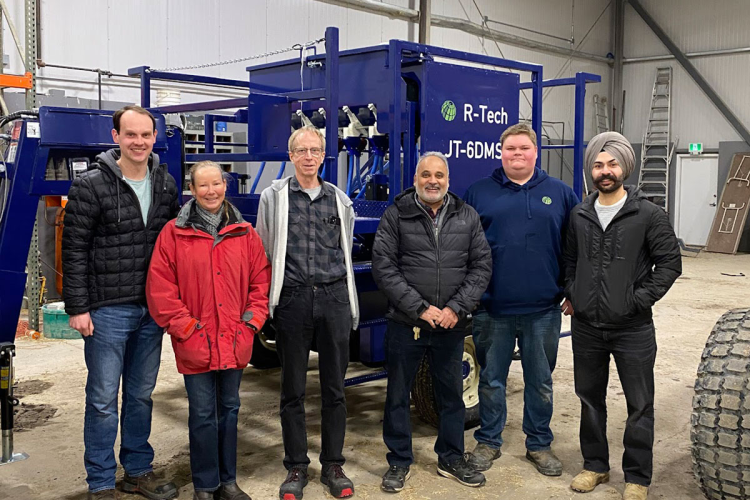One of Canada's top research colleges is kicking the tires on cutting-edge equipment that is expected to give a substantial shot in the arm to crop studies that will help farmers.
Olds College of Agriculture & Technology is calibrating and testing the capabilities of its new zero till seeder that was custom built by R-Tech Industries Ltd. of Manitoba. Researchers are also awaiting delivery of a Wintersteiger Quantum Core small plot combine.
"Our crop research program will benefit from the enhanced data collection capabilities, productivity and efficiencies offered by this combine," said Dr. Shabeg Briar, who is the Lead Research Scientist - Crops at the Olds College Centre for Innovation (OCCI).
"It has modern safety features, ongoing weighing systems and harvesting software, and other advantages. It will be an essential part of OCCI's small plot research and it will be used on up to 50 projects per year."

Projects at the College involve a wide range of industry partners and include cereal crops such as wheat, barley, oats, rye and corn. They also include oilseeds such as canola, along with pulse crops ranging from field peas and faba beans to lentils.
Although both the seeder and the combine will be used on small plots of land measuring about two by six metres, the seeder in particular mirrors a large trend in Canadian agriculture. About 70 per cent of farmers have switched to zero or no till seeding, which involves directly seeding into the stubble in undisturbed fields without prior cultivation, said Briar.
"It reduces farmers' carbon footprint through less fuel consumption, as well as conserves the organic matter and moisture in the soil. It promotes soil health and there are less weeds, and it also saves the farmers time and money by being more efficient."
It is vital for farmers to safeguard the long-term agricultural and environmental sustainability of food production in a world whose population is soaring, said Briar. Problems such as soil erosion due to drought sparked by climate change are becoming an increasing concern across Western Canada even outside traditionally drier areas such as southern Alberta, he said.
He pointed to the College's own fields in central Alberta, which experienced heavy winds during seeding a few years ago. The small plot seeder in use at the time required that soil had to be cultivated before it could be seeded, he said.
"We saw all the black carbon floating in the air, and there was a lot of soil erosion happening. We actually had to reseed some of our plots because all the seed and the fertilizer that we applied got exposed due to soil erosion."
Olds College ranked 14th on a list of Canada's top 50 research colleges in 2024 as determined by Research Infosource Inc. The new zero till seeder was funded by the College and Community Innovation program of the Natural Sciences and Engineering Research Council of Canada (NSERC).
It arrived on campus on March 31 and researchers are currently calibrating it and undergoing training on how to use it, said Briar. He expected the seeder will initially be used this year on about 30 per cent of the College's crop research plots.
It can apply fertilizer at the same time seed is being sown, further promoting efficiency by eliminating another separate field activity, he said. "Without this add-on feature, fertilizer would have to be applied prior to seeding in order to minimize damage or destruction of the seed."
Briar said the purchase of the Quantum Core combine was funded by the Canadian Foundation for Innovation (CFI); Alberta Jobs, Economy and Trade's Research Capacity Program; and Prairies Economic Development Canada. He expected it will be delivered to the College on April 23.













